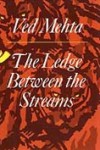
The Ledge Between the Streams
n the summer of 1943, an Indian public-health official (Daddyji) and his wife (Mamaji) were travelling with their six children to the Vale of Kashmir for a holiday. During a break in the journey, their blind nine-year-old son, Ved—the author of this exquisitely composed memoir—heard two streams flowing and asked about them. He was told that one looked clear, the other muddy. He said he wanted to see the streams for himself, and the family climbed down into a gorge where a narrow ledge separated the icy torrents of the Jhelum, a powerful river fed by the snows of the Himalayas, from a tepid, sluggish local stream. Ved squatted down on the narrow ledge and put a hand in each stream. A sudden cloudburst then caused the Jhelum River to rise, and the Mehtas barely scrambled out of the gorge with their lives. The echoes of the author’s experience forty years ago in that gorge—one small incident in this book—haunt the story much as the mysterious Malabar Caves haunt E. M. Forster’s A Passage to India, and, like Forster, Mr. Mehta presents us with a highly original, intimate, and revealing portrait of modern India.
Mr. Mehta writes about the decade 1940-1949, a crucial time in his life and the life of his native country. He recounts the day-to-day joys and sorrows of a large, affectionate well-to-do Hindu family in the Punjab, setting them against the distant thunder of the Second World War and the waning light of the British raj. He describes the growing strife between Hindus and Muslims, and the wave of violence that engulfed India during Partition, which in the Punjab alone left more than ten million homeless and a million dead. He tells how he came to terms with his adolescence; how he learned English, Braille, horseback riding, bicycling, touch typing, roller skating; how he coped with blindness and came to live a normal life. He shows how he became increasingly aware of the disparate currents flowing through his life, much like the two streams: a young man without sight determined to enjoy the advantages of the sighted; a dutiful son daily confronted by the contrasting personalities of his father, trained in Western medicine, and his mother, bound by Hindu tradition; an intelligent boy, his hopes for schooling in his own country thwarted by his blindness, undertaking the adventure of leaving his home and family and coming to the West. At the end of this work, he is on his way to the Arkansas School for the Blind (the only school in the West that will have him), convinced that there the course of the currents will somehow be made plain to him.